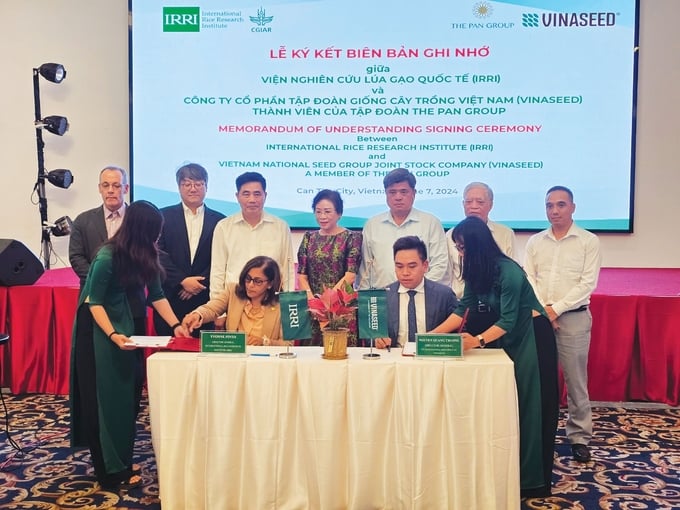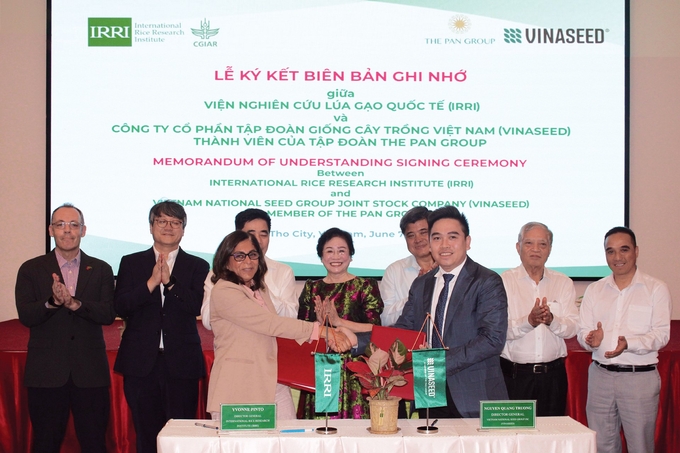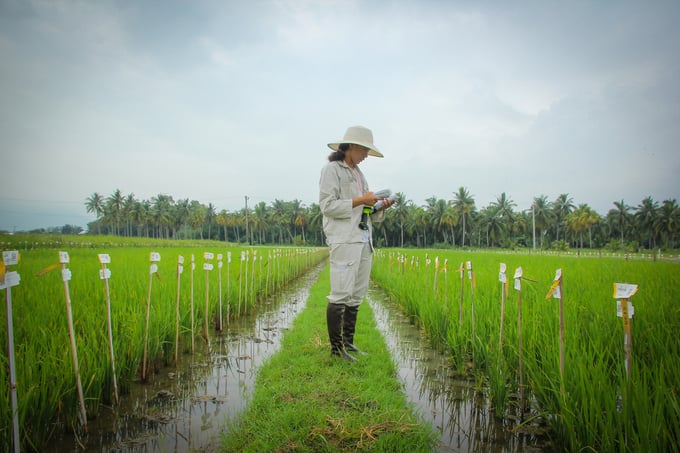November 22, 2025 | 14:37 GMT +7
November 22, 2025 | 14:37 GMT +7
Hotline: 0913.378.918
November 22, 2025 | 14:37 GMT +7
Hotline: 0913.378.918

Memorandum of Understanding signing ceremony between IRRI and Vinaseed.
Dr. Yvonne Pinto, Director General of the International Rice Research Institute (IRRI), and Nguyen Quang Truong, CEO of Vietnam Seed Corporation (Vinaseed), signed a Memorandum of Understanding between IRRI and Vinaseed. This partnership aims to develop and commercialize high-yield, high-quality rice varieties and technologies, with a focus on climate resilience and benefits for public health.
The signing ceremony saw the participation of Deputy Minister of Agriculture and Rural Development Tran Thanh Nam; former Minister of Agriculture and Rural Development Cao Duc Phat, Chairman of the Board of IRRI; Associate Professor Dr. Bui Ba Bong, Chairman of the Vietnam Rice Industry Association; and Dr. Robert Cauwell, IRRI's Country Representative for Vietnam.

The International Rice Research Institute has over 60 years of experience in the rice sector, boasting large-scale research facilities and numerous research centers worldwide.
IRRI maintains a vast gene bank with over 127,000 different rice gene sources. The Institute conducts annual research and development on a range of potential rice lines and varieties; resulting in high-yield, high-quality rice products that help rice farmers boost their economic efficiency and improve the quality of rice for consumers.
Vinaseed is the first science and technology business in Vietnam's crop seed industry, with the largest scale and market share nationwide; and play a significant role in Vietnam's rice sector.

Rice gene research and conservation area at IRRI.
With the goal of providing sustainable agricultural solutions to improve farmers' livelihoods, Vinaseed joined IRRI's Network for Accelerated Rice Varieties for Impact (NARVI) in 2021. Through NARVI, Vinaseed has received nearly 500 promising new pure rice lines, which exhibit resistance to bacterial leaf blight disease, rice blast fungus, and brown planthoppers; as well as tolerance to drought, submergence, and salinity, to support its breeding programs.
The Memorandum of Understanding with IRRI presents a significant opportunity for Vinaseed in research application and technology transfer. Furthermore, the Memorandum lays the foundation for both parties to collaborate in research and technology transfer, thereby co-creating values for farmers and contributing to the overall development of Vietnam's agricultural sector.
The Memorandum of Understanding between IRRI and Vinaseed focuses on the following areas:
- Collaboration in training and technology transfer for gene technology, rice breeding and selection, biostatistics, methods for evaluating gene-environment interactions, and utilizing AI technology to assess rice characteristics.
- Cooperation in acquiring genetic source materials for testing, breeding, and adapting to production conditions in Vietnam.
- Cooperation in researching and improving new high-yield, high-quality rice varieties that are pest-resistant and adaptable to adverse environmental conditions.
During the meeting with Yvonne Pinto, Director General of the International Rice Research Institute (IRRI), Deputy Minister of Agriculture and Rural Development Tran Thanh Nam stated that Vietnam is renowned one of the prominent rice raw material centers in the world. Namely, Vietnam produces over 43 million tons of rice per year, with the Mekong Delta region contributing approximately 24 million tons. This region boasts abundant raw materials that maintain national food security and facilitate Vietnam's participation in the international rice market.
Over the course of its development, the rice industry in Vietnam has received significant support from IRRI. At present, the majority of rice varieties in Vietnam are developed based on research results compiled by IRRI; notably, the Institute has transferred approximately 25 rice seed varieties carrying its brand to Vietnamese stakeholders.
With the aim of promoting the development of Vietnam's rice industry amidst the new global context, Deputy Minister Tran Thanh Nam proposed IRRI to continue supporting Vietnam in establishing high-quality rice standards in combination with building an emission reduction rice brand. Furthermore, Vietnam is seeking support in sharing research results on genetic sources to develop rice varieties capable of adapting to saline conditions and rice varieties with low glycemic index.
Additionally, the Ministry of Agriculture and Rural Development requested IRRI's assistance in constructing circular economy models, thereby establishing a foundation for Vietnam to formulate mechanisms, policies, and develop the circular economic ecosystem within its rice industry.
On the other hand, following the implementation of the "Sustainable Development Project for one million hectares of specialized, low-emission high-quality rice in association with green growth," the Deputy Minister recommended IRRI to enhance cooperation in digital technology development for nutrient management, disease forecasting, farming management, and origin tracing. Moreover, the Deputy Minister encouraged both parties to strengthen the scope of their cooperative partnership, particularly with the Mekong Delta Rice Research Institute as a leading research organization under the Ministry.
Translated by Nguyen Hai Long

(VAN) The information was shared at the seminar 'Urban Agriculture - Solutions for Developing Green Spaces,' organized by the Kinh te & Do thi Newspaper and the Biotechnology Center of Ho Chi Minh City.
/2025/11/19/4141-2-132831_216.jpg)
(VAN) One of Japfa's outstanding solutions is implementing digital transformation and artificial intelligence (AI) to optimize operations, enhance productivity, and advance sustainable development.
/2025/11/19/4847-1-093540_448.jpg)
(VAN) The Gia Lai Provincial People’s Committee had a working session with the delegation of the U.S. Department of Agriculture, the State of Idaho, and representatives of the State's leading enterprises.

(VAN) Ca Mau has a sufficient foundation to become a strong regional aquaculture center, where production integrates the economy, the environment, and the lives of the people.

(VAN) SEIKI Group envisions itself as a pioneer in the ‘dual transformation’ of digital technology and green industry, standing alongside the Government and Vietnamese businesses in their pursuit of sustainable development.

(VAN) The VNGEONET network affirms Viet Nam's progress in mastering digital space, providing a precise positioning data platform to serve socioeconomic development.
/2025/11/14/3247-1-184556_35.jpg)
(VAN) Thai Nguyen is methodically implementing digital transformation in the livestock sector, laying the foundation for a modern, transparent, and sustainable agriculture.